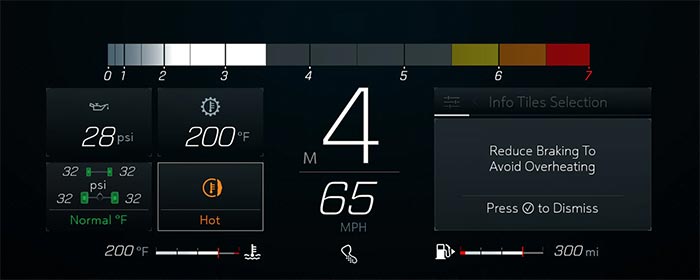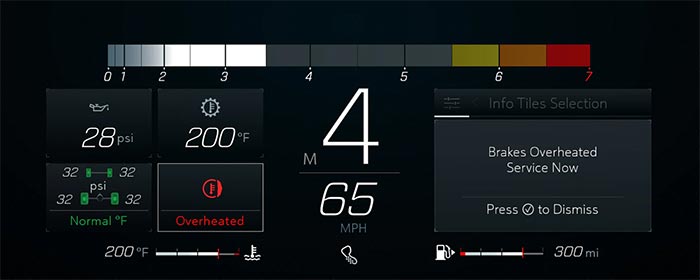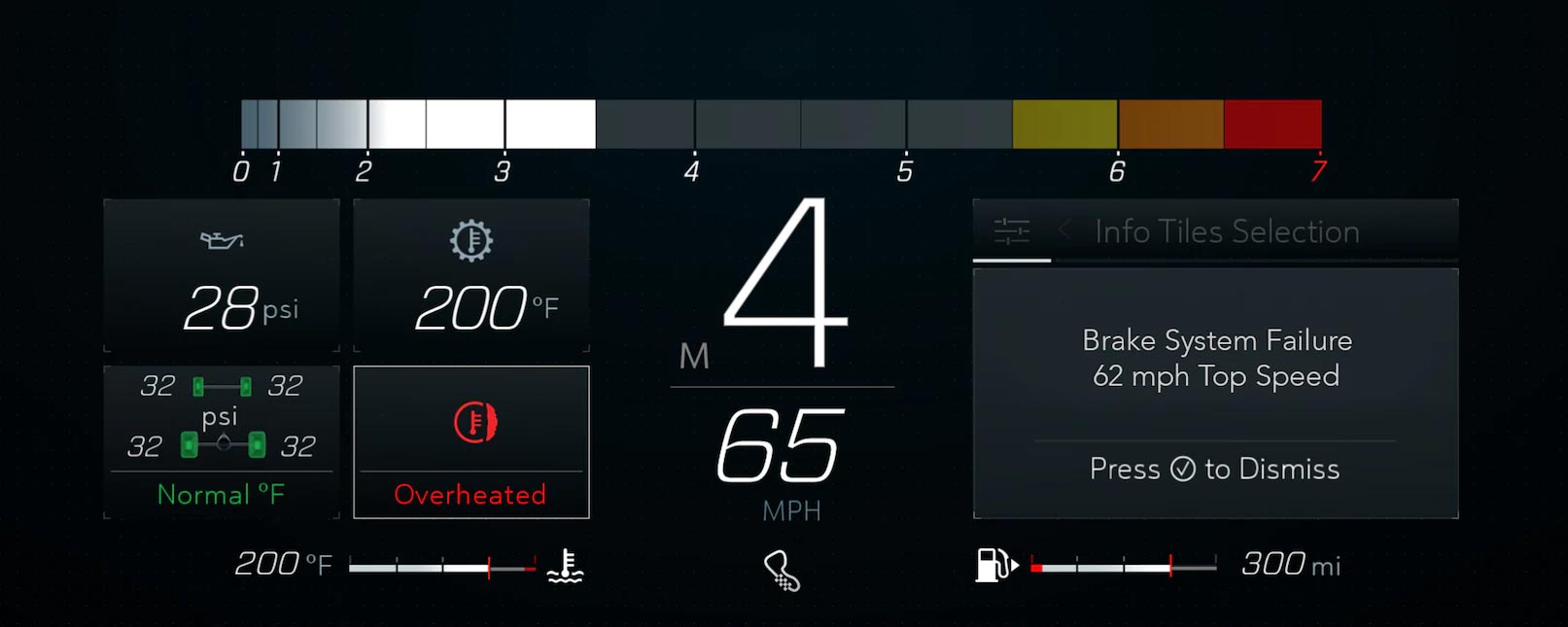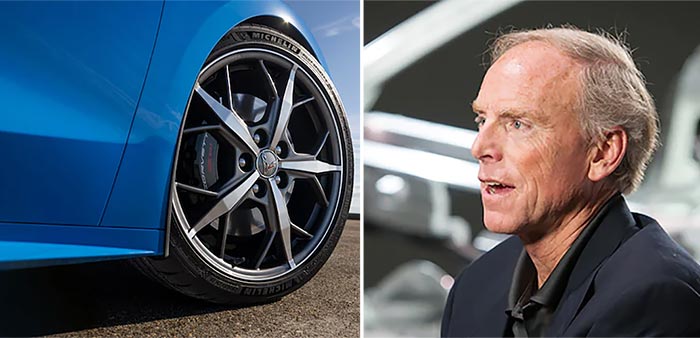The new mid-engine C8 Corvette boasts many firsts for the long-running sports car which includes a brake-by-wire system that Chevrolet calls “eBoost” brakes system. The electronic braking system integrates the master cylinder, electro-hydraulic booster, and ABS modulator into a single unit while eliminating the need for a vacuum pump or vacuum booster. Chevrolet says the eBoost system “enables consistent brake pedal feel in all driving conditions.”
One of the worst feelings a driver can have is attempting to apply the brakes, but your Corvette doesn’t stop right away. That is an example of brake fade where your braking system isn’t generating enough friction to stop the car appropriately.
The C8 Corvette is designed with a two-stage Brake Fade Warning System to alert drivers that brake fade may occur and in the latest installment of “Ask Tadge“, the Corvette chief engineer answers the following question:
“What does the Brake Fade Warning System actually measure? Is it the brake fluid or rotor temperature, or does it somehow quantitate actual brake fade?”
From Tadge Juechter via Chevrolet.com:
The Brake Fade Warning Assist System (FWA) was developed to quantify brake fade and provide both an alert to the driver (Level 1) and a measure of protection for the driver and vehicle in the case of more severe fade (Level 2). The electro-hydraulic brake assist system in the C8 is constantly monitoring many data channels and evaluating them to determine if the system is operating properly. In the case of fade warning, it has been developed to monitor the vehicle usage, determine when the brake usage is high enough to have a risk of fade, and react when that fade occurs.
Brake fade is a very complex phenomenon and is not strictly a function of any one input (for example, temperature). Instead, there are many inputs that will affect brake fade, including but not limited to temperature (rotor bulk temperature and pad temperature), brake power, vehicle speed, ambient conditions, pad thickness and pad conditioning (previous burnish, taper wear, previous high temp exposure, etc.). Additionally, we monitor for fluid boil, which can occur with or without brake fade, especially in the case of older brake fluid or the use of aggressive race friction, which has a much higher metallic content and conducts more heat into the brake fluid. Both of these conditions are complex, so any single measurement point is not enough to detect fade reliably. Instead, when aggressive brake usage is detected, we monitor brake pressure, wheel slip, vehicle deceleration and fluid consumption per brake corner. These inputs allow us to detect and appropriately react to fade, without prematurely warning the driver and allowing full use of the vehicle on the track.

Level 1 warning is just that – a warning that the brakes are nearing a concerning level of fade and that the driver should back up their braking points and reduce brake usage to maintain brake temperature and normal vehicle operation. If this is done, the vehicle will exit fade warning and the driver can resume lapping as before. Above is what the driver will see in the Driver Information Center (right side of the cluster).

Level 2 is more serious, as it is linked to fluid boil or substantial brake fade. Level 2 speed limits the vehicle to 62mph, and sets a diagnostic trouble code (DTC). One advantage of our new electro-hydraulic brake assist system is that it can actually continue to supply fluid in the case of a boil condition on track, or isolate a brake corner in the case of a leak, and can therefore provide a significant amount of deceleration, even when the brake fluid has boiled. However, once the fluid has boiled, it is compromised and must be replaced prior to additional brake usage. This is why there is a speed limit and warning that must be cleared after fresh brake fluid has been flushed. An updated version of the Track Preparation Guide was recently released, which provides more guidance on this warning to help ensure our customers are able to continue to enjoy their track day, should they boil their brake fluid.
However, since the FWA system was developed with the production rotors, pads and calipers, we must recommend using the OEM hardware when on track, as we cannot guarantee that the fade warning system will behave as designed if parts are changed.

We note that last part of Tadge’s answer about the Brake Fade Warning System being developed with stock brake components. In research for this post, we found one user on the Corvette Forum who was utilizing aftermarket Carbotech brake pads and Castrol SRF fluid which is said to be “boil-proof” and during a track date, his Brake Fade Warning System gave him the level 1 alert even though he felt no actual brake fade. So that is something keep that in mind if you are using non-stock brake pads and fluid.
Source:
Chevrolet.com
Related:
[VIDEO] Watch the Corvette Team Presentation from the 2021 NCM Bash
[VIDEO] Rick Conti Thanks Tadge Juechter for the C8 Corvette with a Vanity License Plate
[PODCAST] Corvette Chief Engineer Tadge Juechter is on the Corvette Today Podcast
-


![[POLL] Which of the Seven Retired Colors Will You Miss the Most in 2025? [PODCAST] Corvette Today Previews the 2023 Michelin NCM Bash](https://www.corvetteblogger.com/images/content/uploads/2023/04/041023_1-218x150.jpg)
![[VIDEO] Here are the Important Dates for 2025 Corvette Production and the End of the 2024s [VIDEO] Here are the Important Dates for 2025 Corvette Production and the End of the 2024s](https://www.corvetteblogger.com/images/content/uploads/2024/05/050924_5-218x150.jpg)
![[PICS] CorvetteBlogger Readers Could Win This 2024 Z06. Enter Today! [PICS] The PVGPA Is Giving Away this 2024 Corvette Z06 Convertible Plus $30K Cash](https://www.corvetteblogger.com/images/content/uploads/2024/05/050924_107-218x150.jpg)
Maybe someone will work on the C8 convertible top! Day after I got my 2021 HTC I put the top down. The latches deployed before the top was closed causing it to crash into the strike plate. Error shows in the info center saying top not secure. Car is limited to 58MPH. Dealer had the car 22 days replacing parts. Next day I put the top down and it will not move. 47 degrees outside. Dealer has car 3 days and could not find anything wrong. I was told maybe too cold! Top worked 4-5 times then crashed again.tech GM sent someone from Bowling Green after a couple of weeks. Put more parts on. 32 days later got the car back. Top worked 5-6 times and crashed again. Service technician does know know why the latch is deployed before it closes. It is knocking a sensor out of alignment. Car is back at the dealership for 4th time. Almost 2 months in the shop and no answer! $97,500 out the door for this!!
Three times is the charm, lemon law. turn it in for a new one
Bruce, the 2021 HTC is not available and is more desirable from a market value than the 2021 model. I own a 2020 Z51 HTC in Long Beach red and would not get rid of it for some time – probably 5 years.
Had a somewhat similar problem with my 2020 Z51 CHT. About every 7-8 roof closing operations, Info Center warning “Top Not Secure” would display. Cycling the roof up and down 5-6 times cleared the message a couple of times. Dealer had it for 17 days, looking for a fix. Re-aligned the roof panels, swapped a couple of sensors, gave me the car back. 7-8 openings later, up on a remote part of the Oregon coast with nightfall coming, I could not close the roof (bring it up). The tonneau would open, but roof panels would not budge. After many attempts and much prayer, roof returned to closed position. That saved my L3 interior, as the fog was heavy that night. Put a piece of tape over the switch until I could get it to the dealer. Back in the shop for 15 days. Finally, technician cut a hole in the roof headliner, to observe a motor actuator for proper operation. Actuator was the problem. R & R’d it, along with the cut-up headliner, and I’m 25 cycles downstream now, without a failure. New technology!? Like Mike above, I’m not getting rid of it, or the $4K worth of PPF and Ceramic.
Like “Ivan” above…
Mike
I have had some similar issues with my HTC Z 51 C8. Sensor would not recognize the top was down , even though it was. Dealer replaced driver side opening arm and I thought the issue was solved. However, I too experienced the loud crashing onto the strike plate when closing the top, but it has not reoccurred. Now of the leave the car out in the sun too long and try to lower the top it will show “ top fully closed and not secure” Dealer said they have not dealt with this before and to bring it in so they can look at it. Kind of like exploratory surgery which can turn out worse at times. This problem does not seem to occur when raising the top. I have not yet returned it to the dealership and hoping to find the answer first. Frustrating
This is the fleabag that said cracked corvette wheels are a design flaw so they aren’t covered under warranty!
Comments are closed.